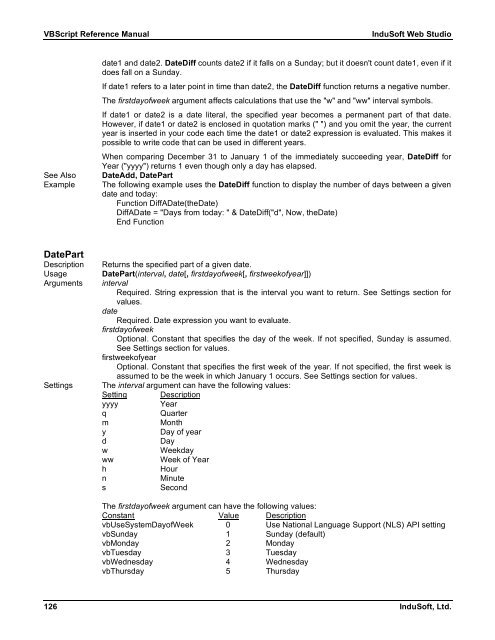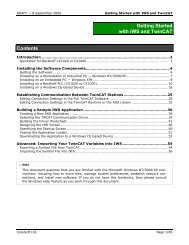VBScript Reference Manual for InduSoft Web Studio
VBScript Reference Manual for InduSoft Web Studio
VBScript Reference Manual for InduSoft Web Studio
You also want an ePaper? Increase the reach of your titles
YUMPU automatically turns print PDFs into web optimized ePapers that Google loves.
<strong>VBScript</strong> <strong>Reference</strong> <strong>Manual</strong> <strong>InduSoft</strong> <strong>Web</strong> <strong>Studio</strong><br />
date1 and date2. DateDiff counts date2 if it falls on a Sunday; but it doesn't count date1, even if it<br />
does fall on a Sunday.<br />
If date1 refers to a later point in time than date2, the DateDiff function returns a negative number.<br />
The firstdayofweek argument affects calculations that use the "w" and "ww" interval symbols.<br />
If date1 or date2 is a date literal, the specified year becomes a permanent part of that date.<br />
However, if date1 or date2 is enclosed in quotation marks (" ") and you omit the year, the current<br />
year is inserted in your code each time the date1 or date2 expression is evaluated. This makes it<br />
possible to write code that can be used in different years.<br />
When comparing December 31 to January 1 of the immediately succeeding year, DateDiff <strong>for</strong><br />
Year ("yyyy") returns 1 even though only a day has elapsed.<br />
See Also DateAdd, DatePart<br />
Example The following example uses the DateDiff function to display the number of days between a given<br />
date and today:<br />
Function DiffADate(theDate)<br />
DiffADate = "Days from today: " & DateDiff("d", Now, theDate)<br />
End Function<br />
DatePart<br />
Description Returns the specified part of a given date.<br />
Usage DatePart(interval, date[, firstdayofweek[, firstweekofyear]])<br />
Arguments interval<br />
Required. String expression that is the interval you want to return. See Settings section <strong>for</strong><br />
values.<br />
date<br />
Required. Date expression you want to evaluate.<br />
firstdayofweek<br />
Optional. Constant that specifies the day of the week. If not specified, Sunday is assumed.<br />
See Settings section <strong>for</strong> values.<br />
firstweekofyear<br />
Optional. Constant that specifies the first week of the year. If not specified, the first week is<br />
assumed to be the week in which January 1 occurs. See Settings section <strong>for</strong> values.<br />
Settings The interval argument can have the following values:<br />
Setting Description<br />
yyyy Year<br />
q Quarter<br />
m Month<br />
y Day of year<br />
d Day<br />
w Weekday<br />
ww Week of Year<br />
h Hour<br />
n Minute<br />
s Second<br />
The firstdayofweek argument can have the following values:<br />
Constant Value Description<br />
vbUseSystemDayofWeek 0 Use National Language Support (NLS) API setting<br />
vbSunday 1 Sunday (default)<br />
vbMonday 2 Monday<br />
vbTuesday 3 Tuesday<br />
vbWednesday 4 Wednesday<br />
vbThursday 5 Thursday<br />
126 <strong>InduSoft</strong>, Ltd.



